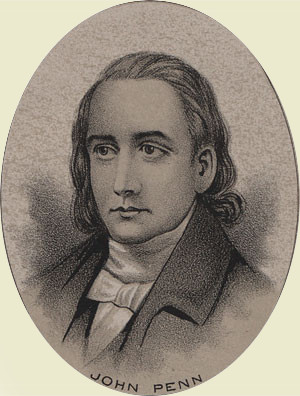John Penn was a North Carolina delegate to the Continental Congress, a signer of the Declaration of Independence, and also a great man. Like many other great men of his time, John’s strength to stand up and risk his life for freedom is the reason our country exists today.
Early Life & Education

John Penn, signer of the Declaration of Independence
Public domain image.
John Penn was born on May 17, 1741 near Port Royal, Virginia. As the only child of Moses and Catherine Penn, John was the center of the world in his wealthy family. John studied for two years at a common school. However, his father did not find education to be of any importance, so John’s studies fell by the wayside.
Upon the death of Moses Penn, John was sent to study under his uncle Edmund Pendleton. There, he learned the art of law. In 1762, he became a Virginia lawyer.
On July 28, 1763, John Penn married Susannah Lyne. The two would go on to have two children.
The Stamp Act
After perfecting the craft of law in Virginia, Penn wanted to move on the something else. In 1774, he moved to Williamsborough, North Carolina to try his hand at politics beyond mere legal practice. He also was beginning to side with the Patriotic views about taxation, and believed the disagreements would only be solved by absolute separation with England. Rather than publicly disagree with his mentor and uncle Edmund Pendleton or be untrue to his own beliefs, he chose to move.
Around this time, Penn was charged with saying disrespectful things about the Stamp Act, and perhaps even King George himself. He was brought to court and found guilty, but the judge, presumably a sympathizer, only charged him one penny. Of course, because of his beliefs, Penn chose not to pay the fine on principle.
Politics & Duel
In 1775, John was elected to the North Carolina Provincial Congress. Soon after, the North Carolina Provincial Congress sent him as a delegate to the Continental Congress, where he would serve 5 years.
Tensions were high during his time in Congress. Many men stood at opposite sides of the liberty scale: some strongly opposed dividing from Britain, whereas others thought it was clearly the only way to resolve anything. John Penn, a zealous man, disagreed in particular with President of Congress, Henry Laurens.
Most of what took place behind those closed doors is swathed in secrecy, but at one point during the proceedings, Laurens apparently openly taunted Penn from his seat. Penn took offense and refused to confirm a point for Laurens later on. Whether this led to the duel that would follow or whether the duel was their tense relationship coming to a head is unclear. Several accounts do say that Laurens took Penn’s refusal as a personal slight and challenged him to a duel, which Penn accepted.
Annals of Philadelphia, written in the 19th century has this to say on the matter:
A singular case of duel occurred in Philadelphia in 1778 or ’79, between Henry Laurens, President of Congress, and Mr. Penn. They were fellow-boarders, and breakfasted together the same morning. They were to fight on a vacant lot vis-a-vis the Masonic Hall, on Chestnut Street. In crossing at Fifth Street, where was then a deep slough, Mr. Penn kindly offered his hand to aid Mr. Laurens, then much the oldest, who accepted it. He suggested to Mr. Laurens, who had challenged him that it was a foolish affair, and it was made up on the spot.
Penn was a huge supporter of liberty right from the start, and in 1776, he signed the Declaration of Independence. The following year, he signed the Articles of Confederation.
Final Years
In 1780, John grew tired of the public life and returned to practicing law. In 1784, John was elected to serve as Receiver of Taxes to this young nation. However, he would only last in this office for four years. On September 14, 1788, John Penn died in his home near Island Creek.


